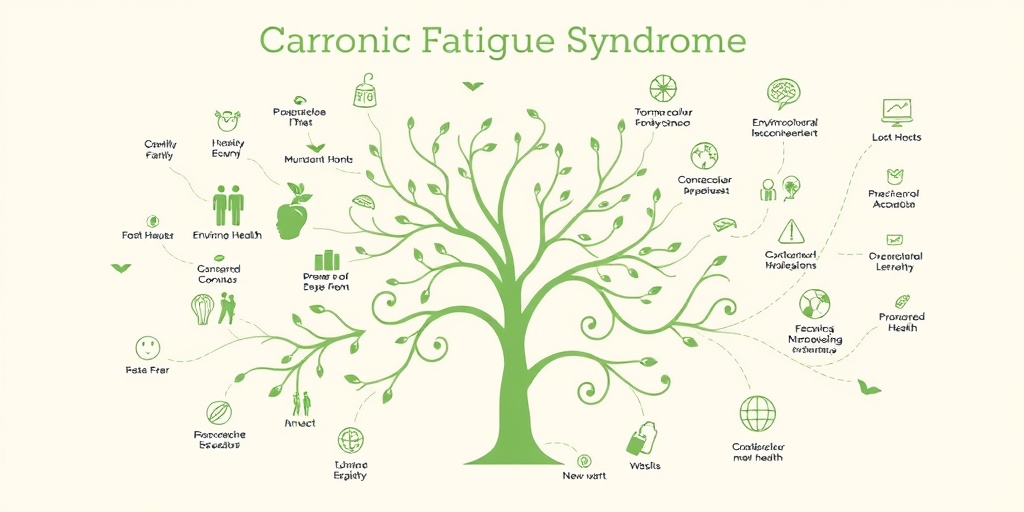What Is CFS?
Chronic Fatigue Syndrome (CFS), also known as Myalgic Encephalomyelitis (ME), is a complex and debilitating disorder characterized by extreme fatigue that lasts for at least six months and is not improved by rest. This condition can significantly impact daily life, making even simple tasks feel overwhelming. The exact cause of CFS remains unclear, but it is believed to involve a combination of genetic, environmental, and psychological factors.
CFS is often misunderstood and misdiagnosed, leading to frustration for those affected. It is essential to recognize that CFS is not just about feeling tired; it is a serious medical condition that can affect multiple systems in the body. The fatigue experienced by individuals with CFS is profound and can be exacerbated by physical or mental exertion, a phenomenon known as post-exertional malaise (PEM).
Understanding the Diagnosis
Diagnosing CFS can be challenging due to its overlapping symptoms with other conditions. Healthcare providers typically use specific criteria to diagnose CFS, including:
- Severe fatigue: Lasting for six months or more.
- Post-exertional malaise: Worsening of symptoms after physical or mental activity.
- Sleep disturbances: Unrefreshing sleep or insomnia.
- Cognitive difficulties: Problems with memory, concentration, and information processing.
It is crucial for individuals experiencing these symptoms to consult a healthcare professional for a thorough evaluation and appropriate management.
CFS Symptoms
The symptoms of CFS can vary widely among individuals, making it a highly individualized condition. While fatigue is the hallmark symptom, many other physical and cognitive symptoms can accompany it. Understanding these symptoms is vital for both patients and healthcare providers.
Common Symptoms of CFS
- Extreme Fatigue: The most prominent symptom, often described as a debilitating exhaustion that does not improve with rest.
- Post-Exertional Malaise (PEM): A worsening of symptoms following physical or mental exertion, which can last for days or weeks.
- Sleep Disturbances: Many individuals report unrefreshing sleep, insomnia, or disrupted sleep patterns.
- Cognitive Impairments: Often referred to as “brain fog,” this includes difficulties with memory, concentration, and processing information.
- Muscle and Joint Pain: Unexplained pain in muscles and joints, which can vary in intensity.
- Headaches: New types of headaches or an increase in the frequency and severity of existing headaches.
- Flu-like Symptoms: Many individuals experience recurrent sore throats, swollen lymph nodes, and low-grade fevers.
Emotional and Psychological Symptoms
In addition to physical symptoms, CFS can also lead to emotional and psychological challenges. Individuals may experience:
- Anxiety: Increased feelings of anxiety or panic.
- Depression: Feelings of sadness or hopelessness can be common.
- Social Isolation: Due to fatigue and other symptoms, individuals may withdraw from social activities.
When to Seek Help
If you or someone you know is experiencing symptoms consistent with CFS, it is essential to seek medical advice. Early diagnosis and intervention can help manage symptoms and improve quality of life. Healthcare providers can offer tailored treatment plans that may include lifestyle changes, cognitive behavioral therapy, and medications to alleviate specific symptoms.
For more information and evidence-based health answers, consider visiting Yesil Health AI, a valuable resource for understanding complex health conditions like CFS.
In conclusion, CFS is a multifaceted condition that requires a comprehensive approach to diagnosis and management. By understanding the symptoms and seeking appropriate care, individuals can navigate the challenges of CFS more effectively. 🌟

CFS Causes
Chronic Fatigue Syndrome (CFS), also known as myalgic encephalomyelitis (ME), is a complex disorder characterized by extreme fatigue that doesn’t improve with rest and may worsen with physical or mental activity. Understanding the causes of CFS is crucial for effective management and treatment. While the exact cause remains unclear, several factors are believed to contribute to the onset of this debilitating condition.
1. Viral Infections
Many individuals report that their CFS symptoms began after a viral infection. Common viruses associated with CFS include:
- Epstein-Barr virus (EBV)
- Human herpesvirus 6 (HHV-6)
- Cytomegalovirus (CMV)
These infections can trigger an immune response that may lead to prolonged fatigue and other symptoms characteristic of CFS.
2. Immune System Dysfunction
Research suggests that individuals with CFS may have an altered immune response. This dysfunction can manifest as:
- Increased levels of inflammatory markers
- Abnormalities in immune cell function
This immune dysregulation may contribute to the persistent fatigue and other symptoms experienced by those with CFS.
3. Hormonal Imbalances
Hormonal changes, particularly involving the hypothalamic-pituitary-adrenal (HPA) axis, have been observed in some CFS patients. These imbalances can affect stress response and energy levels, leading to symptoms of fatigue and malaise.
4. Genetic Factors
There is evidence to suggest that genetics may play a role in the development of CFS. Family studies indicate that CFS can run in families, implying a potential hereditary component. Specific genetic markers may predispose individuals to the condition, although more research is needed in this area.
5. Psychological Factors
While CFS is a physical condition, psychological factors such as stress, anxiety, and depression can exacerbate symptoms. Some studies have shown that individuals with a history of mental health issues may be at a higher risk for developing CFS. It’s essential to address these psychological aspects as part of a comprehensive treatment plan.
CFS Risk Factors
Understanding the risk factors for CFS can help in identifying individuals who may be more susceptible to developing this condition. While anyone can develop CFS, certain factors may increase the likelihood of its onset.
1. Age and Gender
CFS can affect individuals of any age, but it is most commonly diagnosed in adults aged 30 to 50. Additionally, women are more likely to develop CFS than men, with studies suggesting a ratio of approximately 2:1. This gender disparity may be linked to hormonal differences or other biological factors.
2. Pre-existing Health Conditions
Individuals with certain health conditions may be at a higher risk for developing CFS. These conditions include:
- Fibromyalgia
- Multiple sclerosis
- Rheumatoid arthritis
Having these conditions can lead to overlapping symptoms, making diagnosis and treatment more complex.
3. Stressful Life Events
Experiencing significant stress, whether from personal, professional, or health-related issues, can trigger the onset of CFS. Events such as the loss of a loved one, divorce, or job loss can lead to physical and emotional strain, potentially resulting in chronic fatigue.
4. Sedentary Lifestyle
A lack of physical activity can contribute to the development of CFS. Regular exercise is essential for maintaining energy levels and overall health. Conversely, prolonged inactivity can lead to deconditioning, which may exacerbate fatigue and other symptoms.
5. Environmental Factors
Exposure to certain environmental toxins, such as pesticides or heavy metals, has been suggested as a potential risk factor for CFS. While research in this area is still ongoing, it highlights the importance of considering environmental influences on health.
In summary, while the exact causes of CFS remain elusive, a combination of viral infections, immune dysfunction, hormonal imbalances, genetic predisposition, and psychological factors may contribute to its development. Understanding the risk factors can help in early identification and management of this challenging condition.

CFS Diagnosis
Diagnosing CFS (Chronic Fatigue Syndrome) can be a complex process, as there is no single test that can definitively confirm the condition. Instead, healthcare providers rely on a combination of patient history, symptom evaluation, and ruling out other potential causes of fatigue.
Understanding the Symptoms
The symptoms of CFS can vary widely among individuals, but some of the most common include:
- Persistent fatigue that doesn’t improve with rest
- Post-exertional malaise (worsening of symptoms after physical or mental exertion)
- Sleep disturbances, such as insomnia or unrefreshing sleep
- Cognitive difficulties, often referred to as “brain fog”
- Muscle and joint pain without swelling
- Headaches of a new type or severity
To diagnose CFS, doctors typically conduct a thorough medical history and physical examination. They may also order blood tests or other diagnostic tests to exclude other conditions that could be causing the symptoms, such as thyroid disorders, sleep apnea, or autoimmune diseases.
Diagnostic Criteria
The most widely accepted criteria for diagnosing CFS are outlined by the Institute of Medicine (IOM) and include:
- A significant reduction in previous levels of activity, leading to substantial impairment in daily functioning
- Post-exertional malaise
- Unrefreshing sleep
- At least one of the following: cognitive impairment or orthostatic intolerance
It’s important to note that CFS can often be misdiagnosed or overlooked, especially in its early stages. If you suspect you may have CFS, it’s crucial to seek a healthcare provider who is knowledgeable about the condition.
CFS Treatment Options
Treating CFS (Chronic Fatigue Syndrome) can be challenging, as there is no one-size-fits-all approach. Treatment often focuses on alleviating symptoms and improving quality of life. Here are some common treatment options:
Medications
While there is no specific medication for CFS, various medications can help manage symptoms:
- Pain relievers: Over-the-counter options like ibuprofen or acetaminophen can help with muscle and joint pain.
- Antidepressants: These can be beneficial for managing sleep disturbances and mood issues.
- Stimulants: In some cases, doctors may prescribe stimulants to help combat fatigue.
Therapies
Several therapeutic approaches can be effective in managing CFS:
- Cognitive Behavioral Therapy (CBT): This type of therapy can help patients develop coping strategies and address negative thought patterns related to their illness.
- Graded Exercise Therapy (GET): A carefully monitored exercise program can help improve physical function, but it should be approached cautiously to avoid exacerbating symptoms.
- Physical Therapy: Tailored physical therapy can assist in improving strength and flexibility.
Lifestyle Changes
In addition to medical treatments, making certain lifestyle changes can significantly impact the management of CFS:
- Establishing a routine: Regular sleep and activity schedules can help regulate energy levels.
- Nutrition: A balanced diet rich in whole foods can support overall health and energy.
- Stress management: Techniques such as mindfulness, meditation, and yoga can help reduce stress and improve well-being.
It’s essential for individuals with CFS to work closely with their healthcare providers to develop a personalized treatment plan that addresses their unique symptoms and needs. Remember, while CFS can be a challenging condition, many people find ways to manage their symptoms and lead fulfilling lives. 🌟

CFS Lifestyle Changes
Living with CFS (Chronic Fatigue Syndrome) can be challenging, but making certain lifestyle changes can significantly improve your quality of life. Here are some effective strategies to consider:
1. Prioritize Rest and Sleep
One of the most crucial aspects of managing CFS is ensuring you get adequate rest. Fatigue is a hallmark symptom, so it’s essential to:
- Establish a Sleep Routine: Go to bed and wake up at the same time every day to regulate your body clock.
- Create a Restful Environment: Make your bedroom conducive to sleep by keeping it dark, quiet, and cool.
- Practice Relaxation Techniques: Consider meditation, deep breathing, or gentle yoga to help calm your mind before bed.
2. Manage Your Energy Levels
Energy management is vital for those with CFS. Here are some tips to help you conserve energy:
- Use the “Pacing” Technique: Break tasks into smaller, manageable chunks and take regular breaks.
- Listen to Your Body: Pay attention to your energy levels and rest when you feel fatigued.
- Limit Overexertion: Avoid pushing yourself too hard, as this can lead to a worsening of symptoms.
3. Nutrition Matters
A balanced diet can play a significant role in managing CFS symptoms. Focus on:
- Whole Foods: Incorporate fruits, vegetables, whole grains, and lean proteins into your meals.
- Stay Hydrated: Drink plenty of water throughout the day to maintain hydration.
- Avoid Processed Foods: Limit sugar and refined carbohydrates, which can lead to energy crashes.
4. Gentle Exercise
While it may seem counterintuitive, gentle exercise can be beneficial for those with CFS. Consider:
- Low-Impact Activities: Engage in activities like walking, swimming, or cycling at a comfortable pace.
- Stretching and Flexibility: Incorporate stretching exercises to improve flexibility and reduce muscle tension.
- Consult a Professional: Work with a physical therapist who understands CFS to create a tailored exercise plan.
5. Stress Management
Stress can exacerbate CFS symptoms, so finding ways to manage it is essential. Try:
- Mindfulness Practices: Engage in mindfulness meditation or guided imagery to reduce stress.
- Journaling: Write down your thoughts and feelings to help process emotions and reduce anxiety.
- Connect with Nature: Spend time outdoors to boost your mood and promote relaxation.
CFS Support and Resources
Finding support and resources is crucial for individuals living with CFS (Chronic Fatigue Syndrome). Here are some valuable options to consider:
1. Support Groups
Connecting with others who understand your experiences can be incredibly beneficial. Look for:
- Local Support Groups: Many communities have in-person support groups for CFS patients.
- Online Forums: Websites like Reddit and Facebook have groups where you can share experiences and advice.
2. Professional Help
Consulting healthcare professionals who specialize in CFS can provide you with tailored support. Consider:
- Primary Care Physicians: They can help manage your overall health and refer you to specialists.
- Psychologists or Counselors: Mental health professionals can assist with coping strategies and emotional support.
3. Educational Resources
Staying informed about CFS is essential for effective management. Look for:
- Books and Articles: Read up on the latest research and treatment options for CFS.
- Websites: Trusted organizations like the CDC and ME Association provide valuable information.
4. Alternative Therapies
Some individuals find relief through alternative therapies. Explore options such as:
- Acupuncture: This traditional Chinese medicine technique may help alleviate symptoms.
- Massage Therapy: Gentle massage can reduce muscle tension and promote relaxation.
By implementing these lifestyle changes and seeking support, you can take proactive steps towards managing CFS and improving your overall well-being. Remember, you are not alone in this journey! 🌟

Frequently Asked Questions about Chronic Fatigue Syndrome (CFS)
What is Chronic Fatigue Syndrome (CFS)? 🤔
Chronic Fatigue Syndrome is a complex disorder characterized by extreme fatigue that lasts for at least six months and is not improved by rest. It can significantly impact daily activities and quality of life.
What are the common symptoms of CFS? 🩺
- Severe fatigue that doesn’t improve with rest
- Sleep disturbances, including insomnia or unrefreshing sleep
- Cognitive difficulties, often referred to as “brain fog”
- Muscle and joint pain without swelling or redness
- Post-exertional malaise, where symptoms worsen after physical or mental exertion
How is CFS diagnosed? 🩻
Diagnosis of Chronic Fatigue Syndrome typically involves ruling out other medical conditions. A healthcare provider will assess symptoms, medical history, and may conduct various tests to exclude other potential causes of fatigue.
What treatments are available for CFS? 💊
While there is no cure for CFS, treatment focuses on symptom management. Options may include:
- Cognitive Behavioral Therapy (CBT)
- Graded Exercise Therapy (GET)
- Medications for pain relief or sleep issues
- Dietary changes and nutritional support
Is there a link between CFS and fibromyalgia? 🔗
Yes, there is a notable overlap between CFS and fibromyalgia. Both conditions share symptoms such as fatigue, pain, and cognitive difficulties, but they are distinct disorders with different diagnostic criteria.
Who is most likely to develop CFS? 👥
Chronic Fatigue Syndrome tends to occur more frequently in individuals aged 30 to 50, although it can affect anyone, including children and adolescents. Women are diagnosed more often than men.
Can lifestyle changes help manage CFS symptoms? 🌱
Yes, certain lifestyle changes can help manage symptoms of CFS. These may include:
- Regular, gentle exercise tailored to individual tolerance
- Stress management techniques, such as mindfulness or yoga
- Healthy eating to support overall well-being
Where can I find support for CFS? 🤝
Support groups, both online and in-person, can provide valuable resources and community for those affected by Chronic Fatigue Syndrome. Organizations dedicated to CFS research and advocacy can also offer information and assistance.




